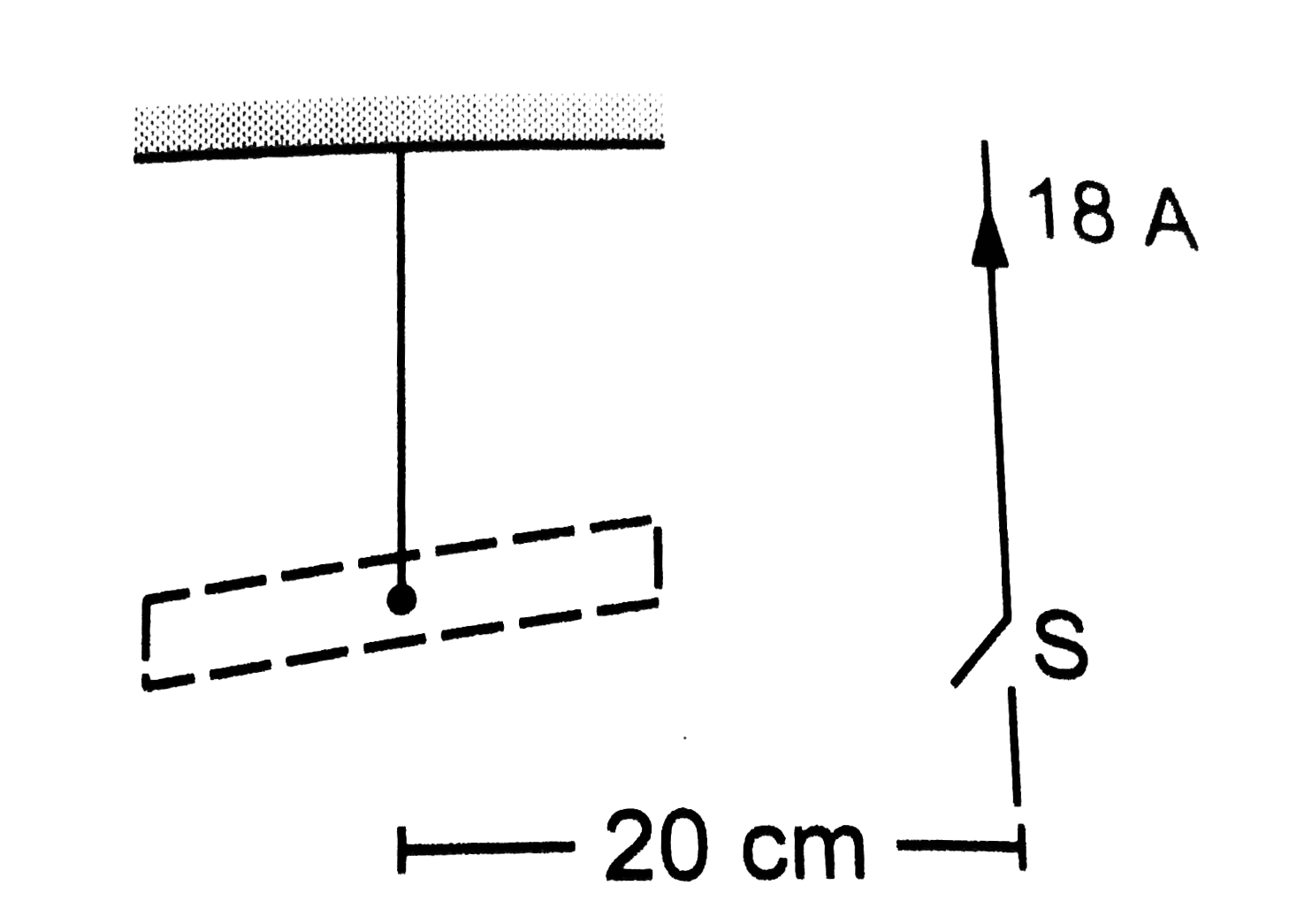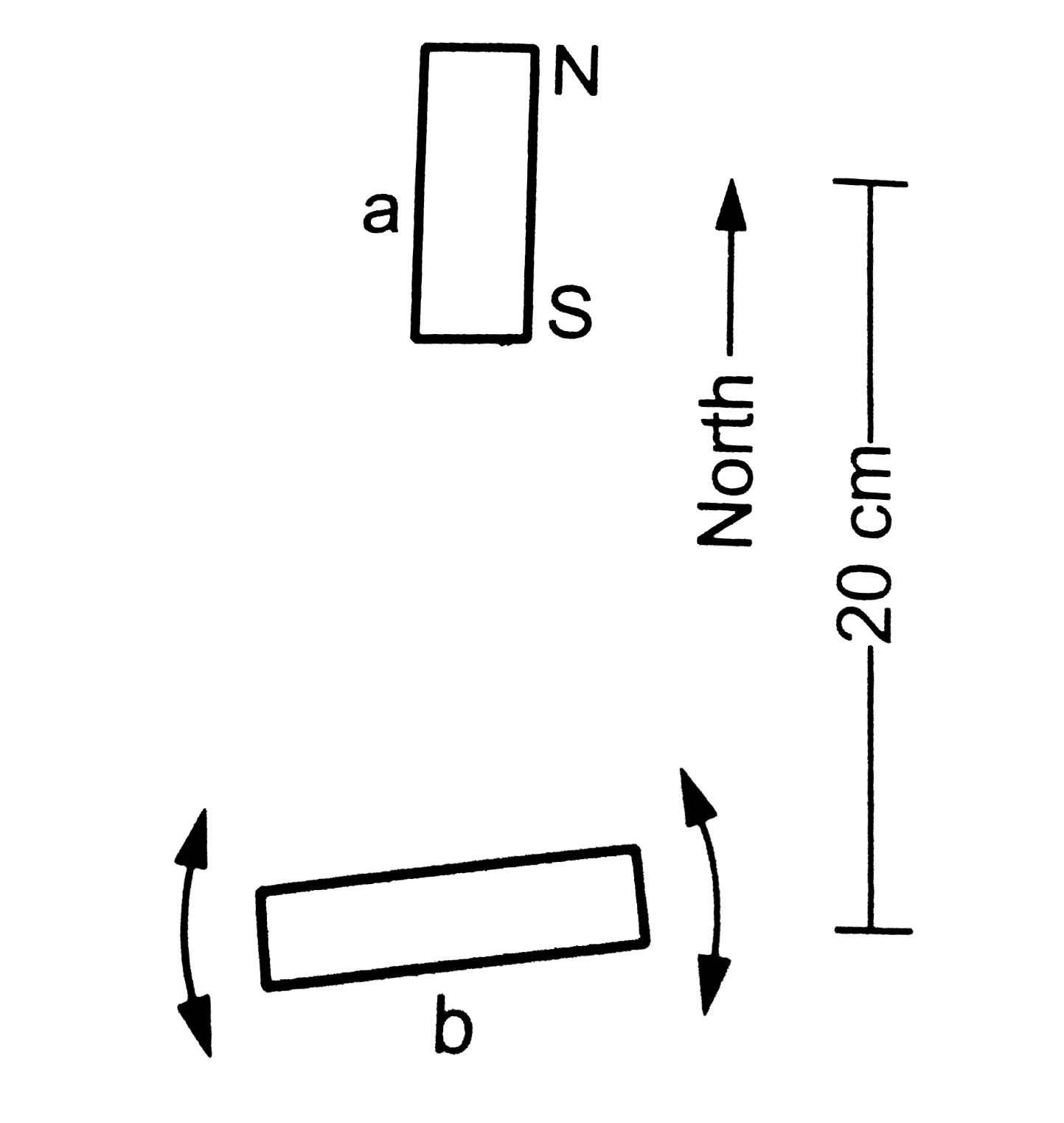Complete Solutions to Worker out examples of chapter PERMANENT MAGNETS of Class 12 book with complete answers and questions
| Class 12 | PHYSICS |
| Chapter | PERMANENT MAGNETS |
| HC VERMA | Worker out examples |
| Number Of Questions | 19 |
| Academic Year | 2023-24 |
A bar magnet has a pole strengh of `3.6 A m` and magnetic length `8cm`. Find the magnetic field at (a) `a` point on the axis at a distance of `6cm` from the centre towards the north pole and (b) a point on the perpendiuclar bisector at the same distance.
View SolutionA magnet is suspended by a vertical string attached to its middle point. Find the position in which the magnet can stay in equilibrium. The horizontal component of the earth's magnetic field ` = 25 mu T` and its vertical component `40 mu T`. Assume that the strign makes contact with the magnet only at a single point.
View SolutionA magnetic needle having magnetic moment `10 A m^2` and length 2.0 cm is clamped at its centre in such a way that it can rotate in the vertical east-west plane. A horizontal force towards east is applied at the north pole to keep the needle fixed at an angle of `30^0` with the vertical. Find the magnitude of the applied force. The vertical component of the earth's magnetic field is `40 muT`.
View SolutionThe magnetic scalar potential due to a magnetic dipole at a point on its axis situated at a distance of 20cm from its centre is found to be `1.2 xx 10^(-5) T m`. Find the magnetic moment of the dipole.
View SolutionA bar magnet of magnetic moment `2.0 A m^2` is free to rotate about a vertical axis through its centre. The magnet is released from rest from the east-west position. Find the kinetic energy of the magnet as it takes the north-south position. The horizontal component of the earth's magnetic field is `B = 25 muT`.
View SolutionFigure shows two identical magnetic dipoles `a and b` of magnetic moments `M` each, placed at a separation `d`, with their axes perpendicular to each other. Find the magnetic field at the point `P` midway between the dipoles.

View SolutionA bar magnet of length `8 cm` and having a pole strengh of `1.0 A m` is placed vertically on a horizontal table with its south pole on the table. A neutral point is found on the table at a distance of 6.0 cm north of the magnet. Calculate the earth's horizontal magnetic field.
View SolutionThe magnetic field at a point on the magnetic equator is found to be `3.1 xx 10^(-5) T`. Taking the earth's radius to be 6400 km, calculate the magneitc moment of the assumed dipole at the earth's centre.
View SolutionA earth's magnetic field at geomagnetic poles has a magnitude `6.2 xx 10^(-5) T`. Find the magnitude and the direction of the field at a point on the earth's surface where the radius makes an angle of `135^@` with the axis of the earth's assumed magnetic dipole. What is the inclination (dip) at this point?
View SolutionA magnetic needle free to rotate in a fixed vertical plane stays in a direction making an angle of `60^@` with the horizontal. If the dip at that plane is `37^@`, find the angle of the fixed vertical plane with the meridian.
View SolutionA dip circle shows an apparent dip of `60^@` at a place where the true dip is `45^@`. If the dip circle is rotated through `90^@`, what apparent dip will it show?
View SolutionA magnetic needle of length 10cm, suspended at its middle point through a thread, stays at a an angle of `45^@` with the horizontal. The horizontal component of the earth's magnetic field is `18 muT`. (a) Find the vertical component of this field. (b) If the pole strength of the needle is `1.6 A-m`, what vertical force should be applied to an end so as to keep it in horizontal position?
View SolutionA tangent galvonnometer has a coil 50turns and a radius of 20cm. The horizontal component of earth's magnetic field is `B_(H)=3xx10^(-5)`. What will be the current which gives a deflection of `45^(@)`?
View SolutionA moving coil galvanometer has 100 turns and each turn has an area `2.0 cm^2`. The magnetic field produced by the magnet is `0.01 T`. The deflection in the coil is `0.05` radian when a current of `10 mA` is passed through it. Find the torsional constant of the suspension wire.
View SolutionA galvanometer coil has a resistance of `100 Omega`. When a current passes through the galvanometer, 1% of the current goes through the coil and the rest through the shunt. Find the resistance of the shunt.
View SolutionThe needle of a deflection magnetometer deflects through `45^@` from north to south when the instrument is used in Tan-A position with a magnet of length 10cm placed at a distance of 25cm. (a) Find the magnetic moment of the magnet if the earth's horizontal magnetic field is `20 muT`. (b) If the magnetometer is used in `Tan-B` position with the same magnet at the same separation from the needle, what will be the deflection?
View SolutionFigure shows a short magnet executing small oscillations in an oscillation magnetometer in earth's magnetic field having horizontal component `24 muT`. The time period of oscillation is `0.10 s`. An upward electric current of `18 A` is established in the vertical wire placed 20cm east of the magnet by closing the switch `S`. Find the new time period

View SolutionThe frequency of oscillation of the magnet in an oscillation magnetometer in the earth's magnetic field is 40 oscillations per minute. A short bar magnet is placed to the north of the magnetometer, at a separation of 20cm from the oscillating magnet, with its north pole pointing towards north (figure). The frequency of oscillation is found to increase to 60 oscillations per minute. Calculate the magnetic moment of this short bar magnet. Horizonatl component of the earth's magnetic field is `24 muT`.

View SolutionA bar magnet of mass 100 g, length 7.0 cm, width 1.0 cm and height 0.50 cm takes `pi/2` seconds to complete an oscillation in an oscillation magnetometer placed in a horizontal magnetic field of `25 muT`. (a) Find the magnetic moment of the magnet. (b) If the magnet is put in the magnetometer with its `0.50cm` edge horizontal, what would be the time period?
View Solution
Worker out examples questions and complete solutions for chapter PERMANENT MAGNETS of HC VERMA PHYSICS (ENGLISH) of Class 12